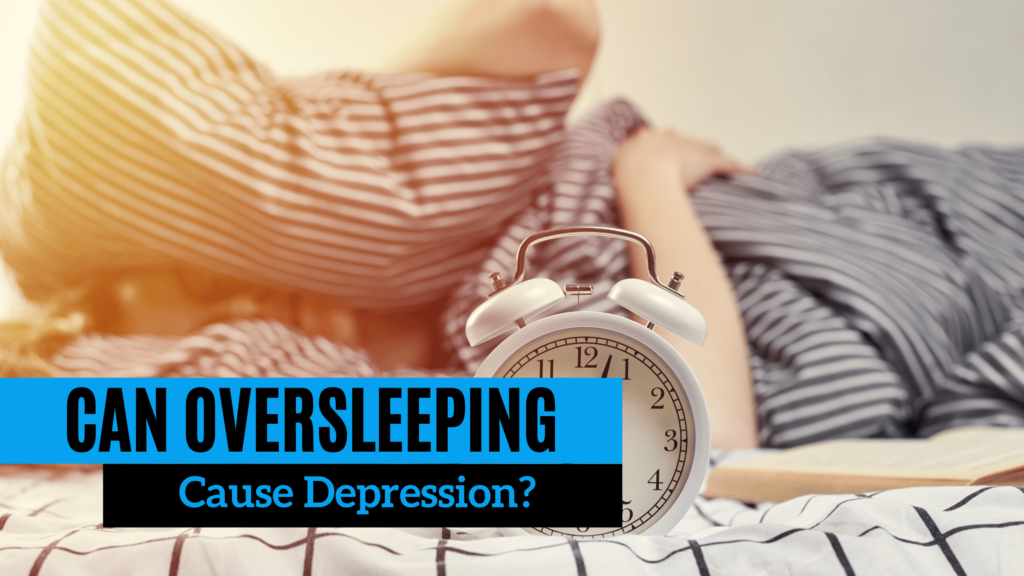Oversleeping, also known as hypersomnia, refers to the habit of sleeping more than the recommended duration, typically exceeding 9 hours per night.
On the other hand, depression is a mental health disorder characterized by persistent feelings of sadness, loss of interest or pleasure in activities, and various physical and cognitive symptoms. In this article, we explore the potential link between oversleeping and depression.
What is the link between oversleeping and depression?
-
Research Findings
Recent studies have suggested a correlation between oversleeping and depression. Individuals who consistently oversleep may have a higher risk of developing or exacerbating depressive symptoms. Research indicates that oversleeping disrupts the body’s natural circadian rhythm, leading to alterations in neurotransmitter levels that are associated with mood regulation.
-
Correlation vs. Causation
It’s essential to distinguish between correlation and causation when discussing the relationship between oversleeping and depression. While oversleeping often coexists with depression, it’s unclear whether one directly causes the other. Other factors, such as lifestyle choices, genetics, and underlying medical conditions, may contribute to both oversleeping and depression.
Effects of oversleeping on mental health
-
BMI & Weight Gain
Studies have correlated oversleeping with an increased Body Mass Index (BMI), possibly leading to increased chances of weight gain and diabetes.
-
Psychological Issues
There is a bidirectional relationship between sleep and mental health. Oversleeping can be both a symptom and a cause of mental health issues such as depression and anxiety.
-
Cognitive Impairment
Regular oversleeping can affect cognitive functions, leading to memory, decision-making, and concentration issues.
-
Sleep Quality
Oversleeping can disrupt the body’s natural sleep-wake cycle, leading to poorer sleep quality. This results in nonrestorative sleep, making individuals feel tired even after long sleep durations.
-
Productivity
Oversleeping can lead to reduced productivity, missed opportunities, and strained relationships due to the significant amount of time spent sleeping, lethargy, and lack of energy often experienced upon walking.
-
Impact on Mood
Excessive sleep can disrupt the balance of neurotransmitters in the brain, such as serotonin and dopamine, which play crucial roles in regulating mood. As a result, oversleeping may lead to feelings of lethargy, apathy, and sadness, contributing to the development or worsening of depression symptoms.
Factors contributing to oversleeping
-
Lifestyle Factors
Unhealthy lifestyle habits, such as irregular sleep schedules, excessive screen time before bedtime, and poor sleep hygiene, can contribute to oversleeping. Factors like stress, work-related demands, and social obligations may also disrupt sleep patterns, leading to excessive sleep on weekends or days off.
-
Medical Conditions
Certain medical conditions, such as sleep disorders (e.g., sleep apnea, narcolepsy), hormonal imbalances, and psychiatric disorders (e.g., bipolar disorder), can contribute to oversleeping. These underlying health issues may also increase the risk of developing depression or exacerbate existing depressive symptoms.
Recognizing oversleeping as a symptom of depression
-
Identifying Signs
It’s essential to recognize the signs of oversleeping as a potential symptom of depression. Persistent feelings of fatigue, excessive daytime sleepiness, difficulty waking up in the morning, and prolonged periods of sleep may indicate underlying mental health concerns that warrant further evaluation.
-
Seeking Professional Help
If you or someone you know is experiencing symptoms of depression or oversleeping, it’s crucial to seek professional help from a qualified healthcare provider or mental health professional. A comprehensive evaluation can help identify underlying causes and develop personalized treatment strategies to address both oversleeping and depression effectively.
Strategies to address oversleeping and depression
-
Establishing a Sleep Routine
Creating a consistent sleep schedule and practicing good sleep hygiene can help regulate sleep patterns and improve overall sleep quality. Aim for seven to nine hours of sleep per night and avoid oversleeping on weekends or days off to maintain a healthy sleep-wake cycle.
-
Seeking Therapy
Therapeutic interventions, such as cognitive-behavioral therapy (CBT) and interpersonal therapy (IPT), can be beneficial for individuals struggling with oversleeping and depression. Therapy sessions can help individuals identify negative thought patterns, develop coping strategies, and improve overall mental well-being.
Conclusion
While oversleeping and depression often coexist, the relationship between the two is complex and multifaceted. While oversleeping may exacerbate depressive symptoms, it’s essential to address underlying factors contributing to both conditions. By recognizing the signs of oversleeping as a potential symptom of depression and seeking professional help, individuals can take proactive steps to improve their mental health and well-being.
FAQs
-
Can oversleeping be a sign of depression?
Yes, oversleeping can sometimes be a symptom of depression, although it’s essential to consider other factors and seek professional evaluation for an accurate diagnosis.
-
How much sleep is considered oversleeping?
Oversleeping is typically defined as sleeping more than nine hours per night on a regular basis, although individual sleep needs may vary.
-
What are the risks of oversleeping?
Oversleeping can increase the risk of various health issues, including obesity, diabetes, heart disease, and mental health disorders like depression.
-
Is it possible to oversleep without feeling refreshed?
Yes, oversleeping can disrupt sleep quality, leading to grogginess, fatigue, and poor mental clarity upon waking.
-
What should I do if I suspect I’m oversleeping due to depression?
If you suspect that oversleeping may be a symptom of depression, it’s essential to seek professional help from a healthcare provider or mental health professional for evaluation and treatment.

